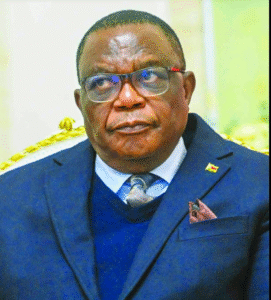ZIYAMBI MOVES TO CHANGE CONSTITUTION AS MNANGAGWA PUSHES TO STAY IN POWER

President Emmerson Mnangagwa’s push to stay in power beyond his constitutional term limit is now official. Justice Minister Ziyambi Ziyambi has begun the legal process to change the constitution, setting the stage for Mnangagwa to remain in office past 2028—possibly until 2030 or longer.
This marks a dramatic shift from Mnangagwa’s promises in 2017. Back then, he claimed to respect Zimbabwe’s constitution and vowed not to cling to power. But now, despite public denials, his government is laying out a path to do exactly that. The move began with a Zanu PF conference in Bulawayo last October, where party members passed a resolution allowing Mnangagwa to extend his term. The resolution itself admitted that changing the constitution would be difficult—but not impossible.
Speaking to The Sunday Mail, Ziyambi explained the process in detail. According to him, Zanu PF’s resolutions come from consultations at every level, from district meetings to the national conference. Once adopted, these resolutions are treated as government policy. The Secretary-General of Zanu PF writes to the relevant ministries to begin implementing the decisions. For Mnangagwa’s term extension, that means legal amendments must begin.
Ziyambi said the constitutional amendment process will involve several steps: drafting principles, getting Cabinet approval, and writing the Bill. After that, the Cabinet Committee on Legislation must review it before it goes back to Cabinet and then to Parliament. From there, it is published for public consultation. If the Bill passes Parliament, it will trigger two national referenda to change the constitution.
The minister claims this process is democratic and driven by “the will of the people.” But critics strongly disagree. Many see this as a top-down plan by Zanu PF to keep Mnangagwa in power and block Vice-President Constantino Chiwenga from taking over. Chiwenga and his military-aligned faction have shown clear signs of resisting Mnangagwa’s 2030 ambitions.
The problem is not just the legal steps—it’s the legitimacy of the entire process. Civil society and opposition leaders argue that Zanu PF’s internal “grassroots” do not reflect the will of the nation. These local structures are often packed with party loyalists who simply rubber-stamp what leadership wants. What Ziyambi calls public consultation may turn into nothing more than political theatre.
The idea that Mnangagwa can stay in office by re-writing the constitution worries many Zimbabweans. The constitution, adopted in 2013 after years of struggle, was meant to stop the abuse of power seen under Robert Mugabe. It includes clear limits on presidential terms to protect democracy. Now, those limits are under threat.
If Mnangagwa succeeds, it will send a dangerous message: that laws can be bent and institutions ignored for the benefit of one man. Zimbabweans are already suffering under a broken economy, high inflation, and poor services. Now, they must also watch as their democracy is chipped away for political survival.
Ziyambi claims this is about “development” and “continuity.” But real development needs strong institutions, not extended presidencies. The law must protect the people—not the powerful.
As the amendment process moves forward, Zimbabwe faces a critical test. Will citizens rise to defend their constitution? Will Parliament act in the national interest—or just follow orders from the top? And will Zimbabwe’s courts stand for justice, or fold under pressure?
The road to 2030 will not be smooth. But it is already clear: Mnangagwa wants to stay in power. And his government is doing everything it can to make that happen—no matter what the constitution says.




This article tells the truth. Mnangagwa is not following the constitution, he’s changing it to stay in power. We can’t allow this. Zanu PF said in 2017 they were different from Mugabe. But now they’re doing the same thing, trying to rule forever.
The people voted for term limits. Now they want to remove them for one man. This is not democracy. Justice Minister Ziyambi is just following orders. This is not about development—it’s about protecting power at all costs.
Why change leaders when things are improving? Mnangagwa is doing well and deserves to finish what he started. The constitution can be changed if the people want it. This is democracy in action, not dictatorship.